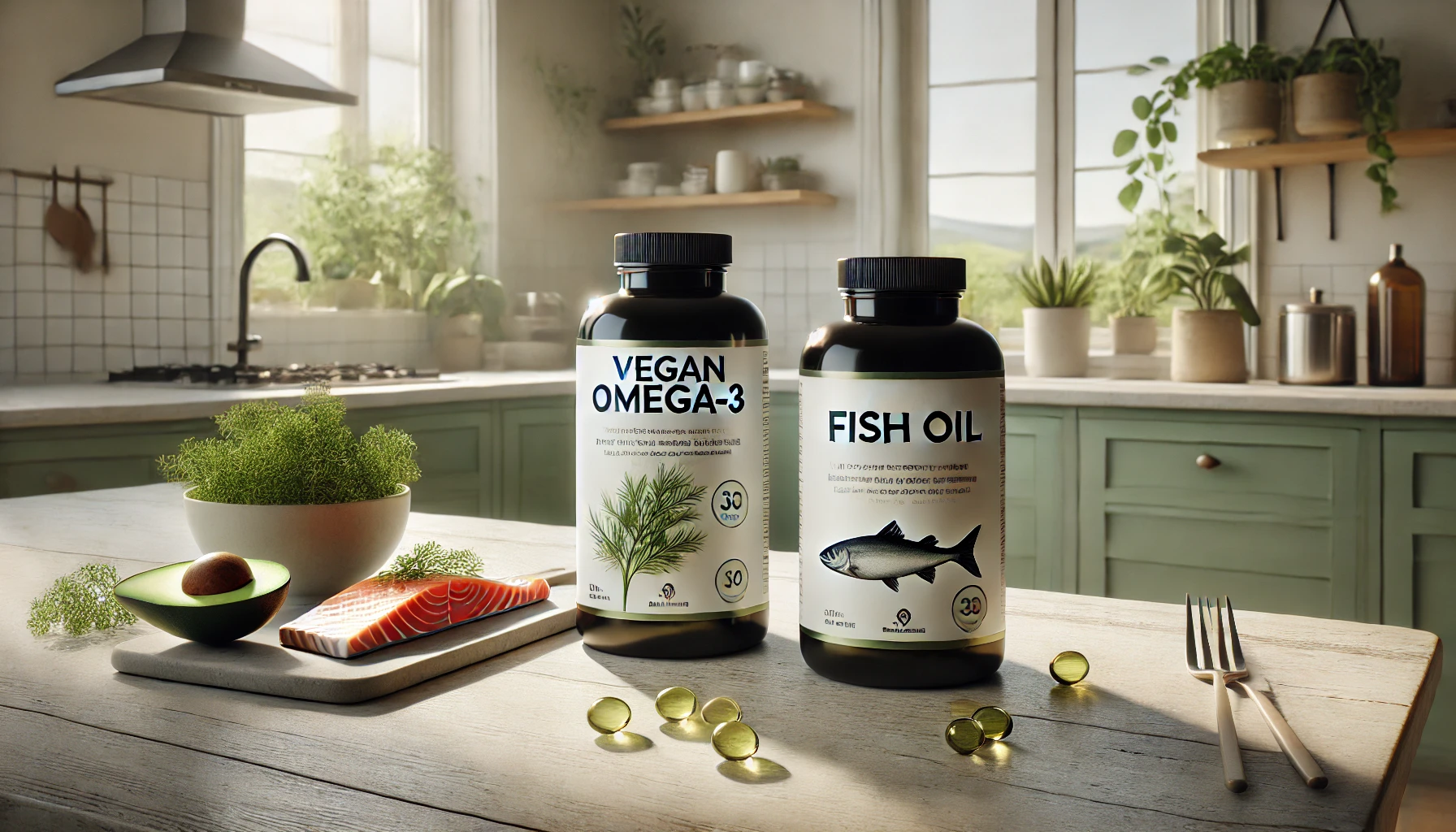A few years ago, a friend of mine made a big life decision: she’d go entirely plant-based. We were chatting over lunch when she brought up one nagging question that still had her stumped – “What about omega-3s?”
For years, she’d relied on fish oil for her daily dose of these essential fatty acids; particularly for their benefits to heart and brain health. But now, with fish off the table, she wasn’t sure if a plant-based option could offer the same perks.
“Is vegan omega-3 really as good as fish oil?” she asked.
Well, she is not the only one. Many people today are curious about plant-based alternatives to traditional supplements, especially as awareness grows around sustainable and ethical choices. With omega-3 fatty acids being so crucial for overall wellness, it is worth understanding if vegan sources can truly match the benefits of fish oil.
So, let’s dive into what makes these supplements tick and figure out whether vegan omega-3 can measure up to its ocean-sourced counterpart.
Understanding Omega-3: Is Omega-3 the Same as Fish Oil?
First up, let’s get clear on what Omega-3 actually is.
Omega-3s are a family of essential fatty acids. Our body need them to function properly and they play a crucial role in heart health, reduction of inflammation, and even brain function support. But the trouble is, the body cannot produce these on its own. So, we need to ingest them through food or supplements.
Omega-3s come in three main forms. These are:
- DHA (docosahexaenoic acid) which is linked to brain development and cognitive health,
- EPA (eicosapentaenoic acid) which is known for reducing inflammation and supporting heart health, and
- ALA (alpha-linolenic acid) which is primarily found in plants and seeds.
Now, the next question is – is vegan omega-3 the same as Fish Oil?
The trick here is to understand that fishes synthesize Omega-3 from micro algae. Hence, fish oil and algae oil essentially contain the same DHA and EPA. In fact, algae oil has the added benefit of having a more neutral taste, as opposed to the fishy smell / aftertaste that comes with fish oil. Moreover, with the widespread contamination of water bodies and fishes, a vegan option like algae oil should actually be considered a better option.
Then there are other plant-based sources (like flaxseed and chia seeds) which provide ALA. Although ALA needs to be converted to DHA and EPA to offer the same benefits.
Vegan Omega-3 vs. Fish Oil: Key Differences
Now that we know what Omega-3s are, let’s take a closer look at how vegan omega-3 compares with fish oil across a few key factors.
- Nutrient Composition: The big selling point of Fish Oil is that it is naturally high in DHA and EPA. These are the two forms of Omega-3 which directly support heart, brain, and joint health. However, some vegan Omega-3 supplements sourced from algae can now deliver nearly equivalent levels of these fatty acids. For example, AIC Vegan Omega-3 has an impressive 3153 mg of combined DHA and EPA per serving, which rivals some fish oil products. But plant-based Omega-3s from sources like flaxseed and chia, contain ALA instead of DHA and EPA. While ALA is beneficial, it requires a conversion process in the body to become DHA or EPA. Due to this, only a small percentage is actually used by the body.
- Absorption and Bioavailability: Fish oil has long been considered the gold standard for bioavailability; meaning it is easily absorbed and used by the body. However, algae-based Omega-3 is proving to be an excellent competitor. Algae oil contains the same forms of DHA and EPA as fish oil and is therefore, also very bioavailable. Besides, algae-based products are often praised for being free from the contaminants like mercury and PCBs (a group of industrial chemicals), which are sometimes found in fish oil. Due to the contaminants, fish oil requires extensive purification.
- Environmental and Ethical Considerations: One of the reasons why many people turn to vegan omega-3 is to reduce their environmental footprint. Fish oil production relies on mass fishing, which can disrupt marine ecosystems and contribute to overfishing. On the contrary, algae can be cultivated sustainably in controlled environments. This not only lowers its environmental impact, but also eliminates the ethical concerns related to fish harvesting. So if eco-friendliness is high on your list, algae-based omega-3s make a strong case.
Pros and Cons of Fish Oil
Fish oil is popular because it is packed with DHA and EPA. Apart from the above mentioned benefits, fish oil can also help reduce triglycerides, lower blood pressure, and even ease symptoms of arthritis. For people with high DHA and EPA needs, fish oil is undeniably effective.
The pros and cons of fish oil are enlisted hereinafter:
(Make a chart)
Pros:
- High in DHA/EPA: Supports brain, heart, and joint health.
- Good bioavailability: Easily absorbed and utilized by the body.
Cons:
- Risk of contaminants: Fish oil can sometimes carry traces of mercury, PCBs, and other pollutants if not properly purified.
- Environmental impact: Overfishing for fish oil disrupts marine ecosystems and can lead to population declines in certain fish species.
- Ethical concerns: Fish oil production depends on animal products, which doesn’t align with vegan or ethical principles for many people.
Is Vegan Omega-3 as Good as Fish Oil?
If the vegan Omega-3 in consideration is algae-based, then there is not much of a difference. Algae supplements are nearly identical to fish oil in their DHA and EPA content and offer similar benefits for heart, brain, and joint health. So, for anyone who needs DHA and EPA but wants to avoid fish products – due to ethical concerns or fear of contamination – algae oil is an excellent choice. However, if you’re relying on ALA sources like flax or chia for omega-3, keep in mind that while they do offer heart health benefits, they aren’t as effective at boosting DHA and EPA levels directly.
Who Benefits from Vegan Omega-3?
Vegan omega-3 is ideal for those who are on a plant-based diet, have fish allergies, or simply want to make a more sustainable choice. It’s also a great alternative for anyone concerned about the environmental or ethical implications of fish oil. While it may take a bit more attention to find high-DHA and high-EPA algae supplements, they’re widely available and can meet your needs without any fish involved.
Choosing the Right Omega-3: Considerations for Your Health and Lifestyle
Here’s a quick guide to help you choose between fish oil and vegan omega-3:
Fish oil may be a good source of DHA and EPA for people who aren’t restricted by dietary and ethical considerations and don’t mind the fishy smell and aftertaste. However, a vegan option like algae oil is a direct source of the same DHA and EPA, has no smell or aftertaste, and does not come at with environmental or ethical considerations.
In fact, some vegan omega-3 supplements come with extra ingredients for additional benefits. For instance, apart from DHA and EPA, AIC Vegan Omega-3 and Brain and Heart Care contains coq10, asthaxanthin, phospholipids, and useful herbs like ashwagandha, bramhi etc., which are good for the brain and heart. Hence, it is 100% vegetarian option which is much better than fish oil.
Once you have decided between fish oil and vegan Omega-3, the next consideration should be to choose a high quality supplement. The following should be borne in mind while considering quality:
- Look for third-party testing: This ensures purity, so you know your supplement is free from contaminants like mercury or PCBs.
- Check DHA and EPA content: Especially for vegan Omega-3, verify that it has the levels you need. Products like AIC Vegan Omega 3 offer 3153 mg of DHA and EPA per serving, which is comparable to fish oil.
- Read labels carefully: Avoid fillers, additives, and any unnecessary ingredients that don’t add value to your health goals.
In the end, both fish oil and vegan Omega-3 have a lot to offer when it comes to supporting your heart, brain, and overall wellness. Fish oil provides tried-and-tested benefits, especially for those who need high DHA and EPA levels. But vegan Omega-3 (particularly from algae) has proven to be a strong alternative as it provides similar health benefits, without environmental and ethical concerns.
Ultimately, the choice between fish oil and vegan Omega-3 is a personal one. Think about your health goals, dietary needs, and values when selecting the supplement that’s right for you. With quality options like Autoimmunity Care’s vegan Omega-3, there are plenty of ways to get the benefits without compromise.





2 Comments